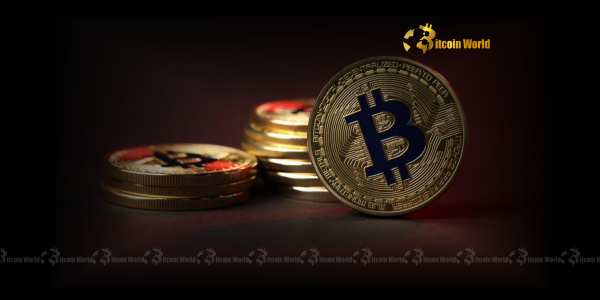BitcoinWorld

Hong Kong Stablecoin: A Bold Leap in Crypto Regulation?
The world of cryptocurrency is always evolving, and regulators are working hard to keep pace. One of the most intriguing developments comes from Hong Kong, a global financial hub. The Hong Kong Monetary Authority (HKMA) is exploring a potentially groundbreaking approach to stablecoin regulation. This move could see them conditionally accept temporary stablecoin depegging, a concept that might sound counterintuitive for a currency designed to maintain a fixed value. But what does this mean for the future of the Hong Kong Stablecoin market, and why is the HKMA considering such a bold step?
Understanding the HKMA’s Stance on Hong Kong Stablecoin Depegging
Stablecoins are digital currencies designed to minimize price volatility by being pegged to a stable asset, like a fiat currency (e.g., USD) or gold. The ‘peg’ is crucial, as it provides the stability that makes stablecoins useful for transactions, remittances, and as a bridge between traditional finance and the crypto world. Depegging, therefore, is usually seen as a failure – a stablecoin losing its intended value parity.
However, the HKMA’s perspective, as reported by JinSe Finance, suggests a nuanced understanding. They might allow temporary depegging under specific, stringent conditions. This isn’t a free pass for stablecoins to lose their value arbitrarily; rather, it’s an acknowledgment that in a fast-moving market, minor, short-term fluctuations can occur without necessarily indicating a fundamental flaw, provided the issuer has robust mechanisms in place. It represents a pragmatic approach to regulating the nascent Hong Kong Stablecoin ecosystem.
The core idea behind this conditional acceptance is to balance market realities with strong investor protection. It’s about building a resilient framework that can withstand minor shocks while ensuring the integrity of the financial system. This forward-thinking stance could position Hong Kong as a leader in digital asset regulation, attracting more innovation and investment into its financial sector.
What Are the Key Conditions for a Resilient Hong Kong Stablecoin?
The HKMA’s potential framework is built on several critical pillars designed to safeguard users and maintain market stability. These conditions are not just suggestions; they are prerequisites for any stablecoin issuer seeking to operate under this new regime. Understanding these requirements is vital for anyone interested in the regulatory landscape of the Hong Kong Stablecoin market.
The reported conditions include:
- Full Redemption Ability: Issuers must at all times maintain the ability to fully redeem their stablecoins for the underlying pegged asset. This is paramount, as it ensures that even if a temporary depeg occurs, holders can still convert their stablecoins back to their original value.
- Preventing Risk Transfer to Holders: The framework aims to prevent stablecoin issuers from transferring operational or market risks onto their holders. This means the onus is on the issuer to absorb any losses or manage the volatility that leads to a temporary depeg, rather than letting holders bear the brunt.
- Prior HKMA Approval on Reserve Composition: Before launching or operating, stablecoin issuers would need to secure explicit HKMA approval on the composition of their reserves. This ensures that the assets backing the stablecoin are sound, liquid, and sufficient to cover all outstanding stablecoins.
- Prior HKMA Approval on Risk-Management Plans: Comprehensive risk-management plans, covering everything from operational risks to market risks and liquidity management, would also require HKMA approval. This proactive approach aims to identify and mitigate potential issues before they escalate.
These conditions highlight the HKMA’s commitment to a robust regulatory environment. They are not simply allowing depegging; they are establishing a controlled environment where it can be managed without causing systemic risk or harming consumers. This approach reflects a deep understanding of both traditional finance principles and the unique characteristics of digital assets, aiming to foster a secure and innovative Hong Kong Stablecoin market.
The HKMA’s potential framework is built on several critical pillars designed to safeguard users and maintain market stability.
How Does This Compare to Global Stablecoin Regulation?
Hong Kong’s proposed stance on conditional depegging offers an interesting contrast to regulatory approaches in other major jurisdictions. While many regulators globally are grappling with stablecoin oversight, few have explicitly considered allowing temporary depegging under specific conditions. This makes the Hong Kong Stablecoin initiative particularly noteworthy.
| Jurisdiction/Framework | Approach to Stablecoins | Depegging Stance |
|---|---|---|
| Hong Kong (Proposed) | Comprehensive licensing, reserve requirements, risk management. | Conditional acceptance of temporary depegging with strict issuer responsibilities. |
| European Union (MiCA) | Extensive regulatory framework for crypto-assets, including asset-referenced tokens (ARTs) and e-money tokens (EMTs). | Emphasis on maintaining peg; robust reserve requirements and redemption rights to prevent depegging. |
| United States (Various Proposals) | Fragmented regulatory landscape; discussions around treating stablecoins as bank deposits or securities. | Strong focus on preventing depegging through 1:1 backing and robust oversight. |
While MiCA in the EU and various proposals in the US primarily focus on preventing depegging through stringent reserve requirements and redemption mechanisms, Hong Kong appears to be acknowledging that even with the best intentions, temporary market dislocations can occur. By setting clear rules for such events, the HKMA aims to build resilience rather than simply outlawing the symptom. This pragmatic stance could provide a more flexible yet secure environment for stablecoin innovation, making the Hong Kong Stablecoin market a unique case study in global regulation.
What Are the Potential Benefits and Challenges for Hong Kong Stablecoin Issuers?
This progressive regulatory approach from the HKMA carries significant implications for stablecoin issuers and the broader digital asset ecosystem in Hong Kong. There are clear benefits that could attract new players, but also challenges that issuers must navigate to comply with the new framework.
Benefits:
- Regulatory Clarity: Providing a clear framework, even for temporary depegging, removes ambiguity and offers legal certainty for stablecoin issuers. This clarity is a major draw for businesses looking to operate in a regulated environment.
- Fostering Innovation: By acknowledging market realities and setting conditions rather than outright bans, the HKMA encourages innovation within a controlled environment. This could lead to the development of more sophisticated stablecoin models and related services within the Hong Kong Stablecoin ecosystem.
- Enhanced Trust and Adoption: A robust, yet flexible, regulatory framework can significantly boost public and institutional trust in stablecoins. This increased confidence could drive wider adoption of stablecoins for various financial activities, from payments to decentralized finance (DeFi).
- Competitive Edge: Hong Kong could gain a competitive advantage as a leading hub for digital assets, attracting global stablecoin projects seeking a well-defined and forward-thinking regulatory landscape.
Challenges:
- High Compliance Burden: Meeting the stringent requirements for full redemption ability, risk transfer prevention, and obtaining prior HKMA approval for reserves and risk management plans will demand significant resources and expertise from issuers.
- Operational Complexity: Managing potential temporary depegging events while ensuring full redemption and preventing risk transfer to holders requires highly sophisticated operational capabilities and real-time monitoring.
- Reputational Risk: Even a conditionally permitted temporary depeg could still cause concern among less informed users, potentially leading to reputational challenges for issuers if not managed with utmost transparency.
- Evolving Landscape: As with any new regulatory framework, there will likely be a period of adjustment and potential refinements. Issuers must remain agile and adaptable to an evolving regulatory landscape for Hong Kong Stablecoin.
Navigating these benefits and challenges will be key for stablecoin issuers looking to capitalize on Hong Kong’s innovative regulatory stance. Success will depend on a strong commitment to compliance, robust operational frameworks, and transparent communication with both regulators and users.
What Are the Actionable Insights for Investors and the Hong Kong Stablecoin Market?
For investors, this development from the HKMA presents both new opportunities and areas requiring careful consideration. Understanding these actionable insights can help navigate the evolving landscape of the Hong Kong Stablecoin market.
Here’s what investors and market participants should consider:
- Due Diligence on Issuers: With conditional depegging on the table, it becomes even more critical to perform thorough due diligence on stablecoin issuers. Focus on their transparency regarding reserve composition, their track record, and their specific risk management plans approved by the HKMA. Look for clear communication channels and robust audit reports.
- Understanding the Depegging Policy: Don’t just assume all stablecoins are the same. Familiarize yourself with the specific conditions under which a stablecoin operating in Hong Kong might temporarily depeg. Understand the issuer’s mechanism for restoring the peg and ensuring full redemption.
- Diversification: While stablecoins are designed for stability, no asset is entirely risk-free. Consider diversifying your stablecoin holdings across different issuers and even different fiat-pegged stablecoins if appropriate for your investment strategy.
- Regulatory Developments: Stay informed about ongoing regulatory developments from the HKMA and other global financial authorities. Regulatory changes can significantly impact the operational environment and perceived safety of stablecoins.
- Potential for New Products: This regulatory clarity could pave the way for new financial products and services built around regulated stablecoins in Hong Kong. Investors should keep an eye out for these innovations, which could offer new avenues for yield or financial utility.
For the broader Hong Kong Stablecoin market, this move signals a maturation of the digital asset space. It suggests a willingness by regulators to engage with the complexities of crypto rather than simply imposing blanket bans. This could lead to increased institutional participation and a more integrated digital asset economy within Hong Kong, setting a precedent for other jurisdictions.
A Compelling Future for Hong Kong Stablecoin?
The HKMA’s consideration of conditionally accepting temporary stablecoin depegging marks a significant moment in global cryptocurrency regulation. It signals a pragmatic and forward-thinking approach, recognizing the dynamic nature of digital assets while prioritizing investor protection and financial stability. By setting clear conditions for full redemption, preventing risk transfer, and demanding prior approval for reserve composition and risk management, Hong Kong is attempting to build a resilient framework that can foster innovation responsibly. This bold move could solidify Hong Kong’s position as a leading global financial technology hub, attracting more investment and talent into its burgeoning digital asset ecosystem. The future of the Hong Kong Stablecoin market appears poised for robust growth under this nuanced regulatory guidance.
Frequently Asked Questions (FAQs)
Q1: What does ‘conditional stablecoin depegging’ mean?
A1: It means the Hong Kong Monetary Authority (HKMA) may allow a stablecoin to temporarily deviate from its pegged value, but only if the issuer meets strict conditions like maintaining full redemption ability, preventing risk transfer to holders, and having prior HKMA approval on reserves and risk management plans.
Q2: Why would the HKMA allow stablecoins to depeg even temporarily?
A2: The HKMA’s approach is pragmatic, acknowledging that minor, short-term market fluctuations can occur. By setting clear rules for these events, they aim to build resilience and provide regulatory clarity, rather than simply banning such occurrences, which could stifle innovation.
Q3: What are the main requirements for stablecoin issuers under this potential framework?
A3: Key requirements include maintaining full redemption ability, ensuring no risk is transferred to stablecoin holders, and securing prior HKMA approval for both their reserve composition and their comprehensive risk-management plans.
Q4: How does Hong Kong’s approach compare to stablecoin regulation in other regions like the EU or US?
A4: While the EU (MiCA) and US proposals focus heavily on preventing depegging through strict backing and oversight, Hong Kong’s proposed framework uniquely acknowledges and sets conditions for managing temporary depegging, aiming for a more resilient and flexible regulatory environment.
Q5: What does this mean for investors interested in the Hong Kong Stablecoin market?
A5: Investors should conduct thorough due diligence on issuers, understand their specific depegging policies, consider diversification, and stay informed about ongoing regulatory developments to make informed decisions in this evolving market.
If you found this article insightful, consider sharing it with your network! Help us spread awareness about the evolving landscape of cryptocurrency regulation and the exciting developments in the Hong Kong Stablecoin market.
To learn more about the latest crypto market trends, explore our article on key developments shaping Bitcoin institutional adoption.
This post Hong Kong Stablecoin: A Bold Leap in Crypto Regulation? first appeared on BitcoinWorld and is written by Editorial Team





